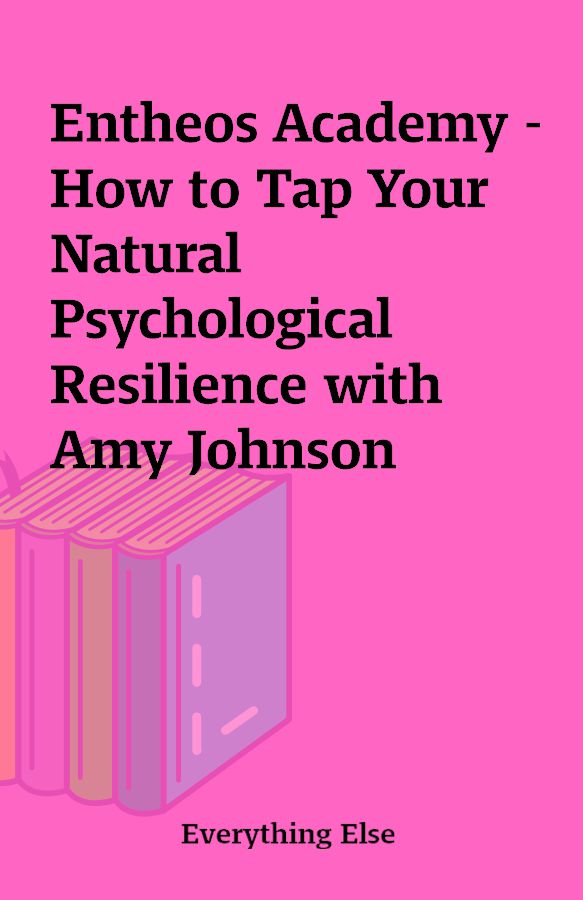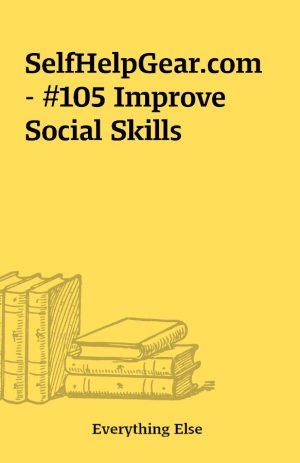Entheos Academy – How to Tap Your Natural Psychological Resilience with Amy Johnson
How to Tap Your Natural Psychological Resilience.mp4
[WebRip – 1 MP4]
Description
Class OverviewAll humans are equipped with an amazing capacity for resilience. We’re used to talking about children being resilient, but we all have the ability to bounce back from anything in life. (Check out the Top 10 Big Ideas from the class below!)Your ProfessorAmy Johnson is a social psychologist, master certified coach, author and public speaker. She has taught university-level psychology and spoken to audiences around the country about success and happiness.How to Tap Your Natural Psychological ResiliencePsychological Resilience: Bouncing Back and Thriving through Anything Have you noticed how, when you’re not feeling great but you’re not trying or doing anything in particular about it, you simply find yourself in a more peaceful feeling? It’s like you’re frustrated…you’re frustrated …you’re frustrated …you look away, and bam! You feel a little better. Less frustrated. A little peaceful, even. You didn’t make it happen. You didn’t pull out any tools or techniques, it just sort of happened on your behalf. Through you, but not by you. All humans are equipped with an amazing capacity for resilience. We’re used to talking about children being resilient, but we all have the ability to bounce back from anything in life. The more you look for all the ways you quite naturally and effortlessly rise back to the surface, the more you experience it.The Top 10 Big Ideas1Resilience Comes From Seeing the Truth of Who You AreIt’s natural to get wrapped up in the physical world. Our eyes point out toward the world around you and it always looks as if things “out there” directly affect how we feel. Yet, when you look a bit deeper, it’s easy to see that there is much more to life than meets the eye. There is a larger force at work doing the heavy lifting—we’re just showing up and taking the credit (or blame). Who you truly are is not affected by what’s swirling around in your environment, or even in your own head. Although it might feel like you’re riding the wild waves of life without a lifejacket, you’re actually safe and sound on shore, watching an illusion unfold.2You Were Born—and You Remain—Fundamentally WellBabies aren’t born psychologically unwell. They have different temperaments. Some startle more easily than others. Some crave more attention than others. Those temperaments and preferences appear to be part of their innate makeup. But they are all mentally healthy and fundamentally well. We aren’t born with confidence issues and we don’t come out judging our neighbors or setting unreasonably high standards for ourselves. I’ve never met a baby who was jealous or antisocial or narcissistic. And despite how it may look, our basic nature does not change as we grow up. We aren’t born perfect and whole but slowly degrade as we age. We retain that inherent wellness and peace of mind throughout life; it only becomes obscured when we’re lost in our heads, experiencing our thinking rather than the world around us. 3The Less You Do, the Better You FeelBecause your default nature is peace of mind and clarity, all you have to “do” to return there is nothing at all. When you leave well enough alone and simply stop adding, doing, fixing, and solving, you find yourself back where you started before you decided to step in. You find yourself reconnected with your true nature. (Note: I’m not saying “do nothing”. I’m saying “there’s nothing you have to do”. They are very different things.) 4Nearly Everything in Nature Self-Corrects. Your Mind is No ExceptionWhen you cut your finger, your body immediately and instinctively goes to work to heal itself. When ecosystems are knocked out of balance, nature’s capacity for self-correction restores homeostasis over time. You are part of the interconnected web of life and thus you have the same self-correcting capability. Your mind—your psyche—will always clear and restore itself.5When Your Mind is (Relatively) Quiet, You Find Your Natural ResilienceIt’s near impossible to feel strong and resilient when you’re caught up in a busy, worried mind. Being lost in thought—in a low state of mind—is all-consuming. You literally see a different world than you do when you are less bogged down in thought. The really great news about thought is that it is impermanent and impersonal. Thought shifts and changes. Thought fades and is replaced with new, often less hectic and less heavy thought. When that shift happens, your state of mind lightens and you find yourself in a more peaceful, relatively quiet place. You find yourself in a nice feeling and within that nice feeling you feel infinitely more resilient. It’s a little ironic that when it feels like you most need resilience (when you’re feeling low), that’s exactly when it’s hardest to come by. And when you’re feeling great and don’t need it, you notice your resilience in spades. But remember: it’s always there, whether you see it or not.6The Slate Completely ClearsOur internal slate is constantly being wiped clean. Remember the Etch A Sketch, that toy where you use a round knob to draw pictures on a magnetic board and then you’d simply shake the board to erase the picture? Our mind is like an Etch A Sketch except it’s even easier because we don’t have to do the shaking. The slate clears on our behalf, no effort required. You always get back to a blank slate. Your experience may not feel like one of constantly returning to an open, full of possibility blank slate. When you’re caught up in thinking and mistaking that thinking for reality, you tend to miss it. But notice, now that you’ve read this, just how often the slate wipes clear and you’re bounced back to greater sense of well-being. Bad moods shift, unhappy memories fade, ruminations grind to a halt. When you look for it, you see it everywhere. 7When We Don’t Fear Our Experiences We Come Face-to-Face With Our ResilienceSydney Banks said, “If the only thing people learned was not to be afraid of their experience, that alone would change the world.” When you allow yourself to experience the natural ups and downs of life, you have experiences but your experiences don’t have you. It is only in fighting what we’re experiencing and trying to change it that we end up stuck in it. When you allow life to unfold before you, life becomes a little more like watching a good movie.Rather than being the helpless main character who is a victim of her circumstances and moods, you’re more like a really involved audience member. You’re engrossed in the plot, excited to see what happens, and rooting for the main character. But a bigger part of you sees that it’s just a show and that no one’s well-being is actually at risk. 8“You” Are Never Truly Hurt; You Are Only ThinkingIt’s not possible to be directly affected by other people, circumstances, or events—people and situations in the physical world do what they do, we have thinking about them, and then we feel our own thinking. That means the worst thing you will ever experience is a fleeting, impersonal, highly subjective thought in your own head. I don’t know about you, but I find that amazingly comforting. 9You Were Designed to Learn and Experience InsightsAlso within the design of human beings (along with being wholly self-correcting and inherently well) is the innate capacity to learn and gain insight naturally and easily. This is clear to see in kids.Children learn at an astonishing rate, partly because they don’t stand in the way of their own evolution by overthinking things, involving their intellect, or having self-doubts about their abilities.Because they don’t know better, they simply learn by nature. When adults don’t interfere with the process, we learn by nature as well.That means you are already hard-wired to see truths that allow you bounce back from suffering and rest in your innate peacefulness. 10It’s All A Game“On a deeper level you are already complete. When you realize that, there is a playful, joyous energy behind what you do” ~Eckhart Tolle Smart, thinking, responsible adults tend to take life so seriously. What if you viewed life as a game that you can’t possibly lose? You’d more easily accept your experiences without fear. You wouldn’t get sidelined by setbacks, and so you’d bounce back swiftly and easily. Experiment with viewing life as a game. It starts to feel like one when you do.
You must be logged in to post a review.






Reviews
There are no reviews yet.